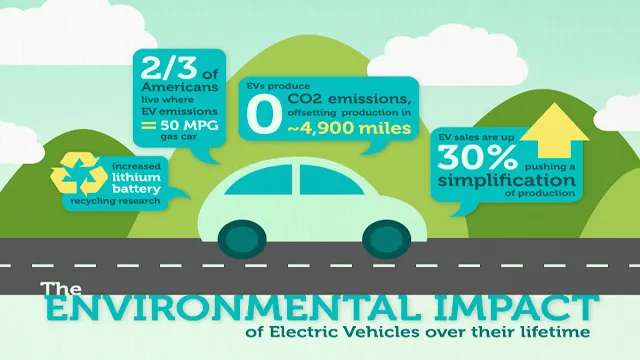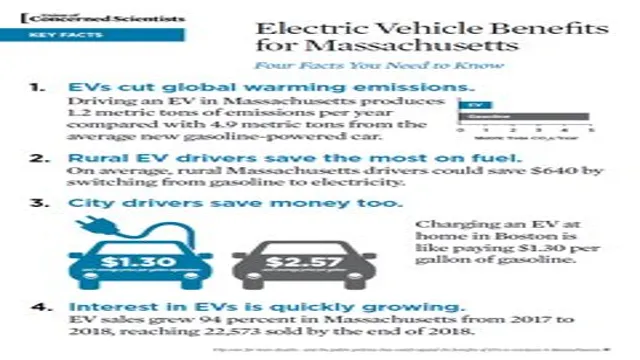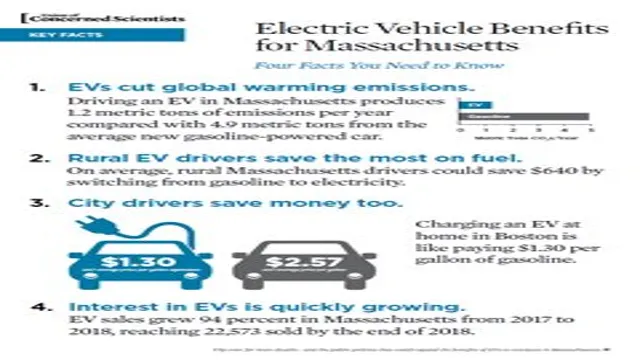Electric Cars: Revolutionizing the Environment for a Better Tomorrow
Electric cars have been making headlines for quite some time as they are often touted as one of the best solutions to reduce the environmental impact of the transportation sector. With the growing concern over climate change, it has become imperative to shift towards green mobility solutions. However, the question is, can electric cars really help us protect the environment? Well, the answer is a resounding yes.
Not only do they emit lower levels of carbon dioxide as compared to gasoline cars, but they also offer a host of other environmental benefits. From reducing pollution to conserving resources, electric cars are a game changer that promises to pave the way towards a more sustainable future.
Reducing Carbon Emissions
The increasing popularity of electric cars has been driven by the benefits they offer on the environment. One of the major advantages of electric cars is that they produce significantly fewer greenhouse gas emissions compared to traditional gasoline cars. Carbon emissions are one of the leading causes of global warming and have devastating effects on the environment, including rising sea levels, severe weather conditions, and increased pollution.
Electric cars help to reduce these harmful carbon emissions by using renewable sources of energy, such as wind or solar power, to charge their batteries. This means that when an electric car is running, it does not emit harmful pollutants into the atmosphere. Therefore, by driving an electric car, you are contributing to a cleaner environment and a healthier planet.
Additionally, electric cars are also much quieter than traditional cars, reducing noise pollution in cities and neighborhoods. Overall, electric cars are a great step towards reducing carbon emissions and ensuring a sustainable future for our planet.
Electric cars produce zero emissions
Electric cars are a fantastic way to reduce harmful carbon emissions. Because they run solely on electricity, there are zero harmful emissions being released into the environment. This not only helps to improve the air quality around us but also helps to decrease our carbon footprint.
Choosing to drive an electric car can help to reduce your own personal carbon emissions by a significant amount when compared to driving a gas-powered car. With a variety of options available on the market, it has never been easier to choose an electric car that suits your lifestyle and budget. By driving an electric car, you can contribute towards reducing the levels of pollution in the air, and make a positive impact on the environment around you.
So why not consider taking the leap towards electric and start reducing carbon emissions today?

Manufacturing electric cars is more energy efficient
When it comes to reducing carbon emissions, it’s essential to find ways to limit our impact on the environment. That’s where the manufacturing of electric cars comes in as a viable solution. We all know that cars that run on gasoline contribute significantly to environmental pollution.
Electric cars are more energy-efficient and cleaner in terms of emissions. That’s because the manufacturing process of electric cars requires less energy than traditional cars. Plus, electric cars don’t use fossil fuels, and they generate fewer greenhouse gas emissions in the long run.
So, when we choose electric cars over traditional ones, we’re making a significant contribution to protecting the environment. By using electric cars, we can reduce our carbon footprint and create a more sustainable future for us and the generations to come.
Charging electric cars with renewable energy
As concerns for the environment and climate change grow, people are becoming more interested in reducing their carbon footprint. One way of achieving this is by using renewable energy to power electric cars. Electric cars are already an excellent alternative to traditional gasoline-powered cars, but pairing them with renewable energy takes them to another level.
Renewable energy sources, such as solar and wind power, produce zero emissions and, therefore, do not contribute to environmental pollution. By charging electric cars with renewable energy, drivers can avoid carbon emissions from the power plants that produce electricity from fossil fuels. This means that while electric cars may be more expensive initially, the savings on fuel costs and environmental benefits make them a more economical and sustainable choice in the long run.
Improving Air Quality
Electric cars have been touted as an environmentally friendly alternative to traditional fossil fuel-powered vehicles. One of the main benefits of electric cars on the environment is their ability to significantly reduce air pollution. Unlike gasoline-powered cars, electric cars do not emit harmful pollutants and particles such as carbon dioxide, nitrogen oxides, and fine particulate matter.
This can lead to a significant improvement in air quality, especially in urban areas with high levels of traffic. In addition to reducing air pollution, electric cars can also help to reduce greenhouse gas emissions that contribute to climate change. By switching to electric vehicles, we can take a significant step towards creating a cleaner, healthier environment for future generations.
It’s important to note that while electric cars have significant environmental benefits, they are not a panacea. To fully realize the potential benefits of electric cars, it’s essential to ensure that the electricity used to power them comes from clean, renewable sources such as wind or solar power.
Electric cars reduce air pollution
Electric cars have become increasingly popular in recent years, and for good reason. One of the most significant benefits of driving an electric car is that they help reduce air pollution. Traditional gasoline-powered cars emit toxic chemicals into the air that can cause serious health problems like respiratory issues, heart disease, and cancer.
Electric cars, on the other hand, produce zero emissions, meaning they don’t release any pollutants into the air, making them a much cleaner and safer option for the environment and our health. By switching to an electric car, you are not only saving money on gas and maintenance costs but also contributing to improving air quality and protecting our planet. So why not make the switch today and do your part in reducing air pollution?
Less noise pollution from electric cars
When it comes to improving air quality in our cities, one of the most significant contributors to pollution is the exhaust fumes that come from traditional gasoline and diesel-powered vehicles. However, electric cars are changing the game in a big way. Not only are they more environmentally friendly in terms of of reducing emissions, but they also help to reduce noise pollution.
Electric cars are much quieter than traditional cars, and while it might not seem like a big deal, the reduction in noise pollution can have a significant impact on our overall quality of life. Think about it—whether you live in a busy city or a quiet suburb, the sound of cars on the road can be a constant source of background noise. By driving electric cars, we can significantly reduce this noise pollution and create a quieter, more peaceful environment for ourselves and those around us.
So not only are electric cars better for the planet, but they can also make our daily lives more enjoyable.
Saving Natural Resources
Electric cars have been hailed as one of the key solutions to combat the negative impact of regular gasoline-powered vehicles on the environment. They offer a range of benefits that go beyond simply reducing carbon emissions. One of the primary advantages of electric cars is the impact they have on natural resources.
The production of gasoline-powered vehicles requires significant amounts of oil and other limited natural resources. In contrast, electric cars can be powered by renewable energy sources like wind and solar power, ultimately reducing the reliance on fossil fuels and other non-renewable resources. This means that as more consumers adopt electric cars, the demand for limited natural resources will gradually decline, reducing the negative impact of human activity on the environment.
Overall, the benefits of electric cars on the environment cannot be overstated, as they represent a much-needed shift towards more sustainable modes of transportation.
Electric cars use less oil and gas
Electric cars are changing the game when it comes to saving natural resources. By relying on electricity rather than fossil fuels, they use far less oil and gas than traditional cars. This is great news for the environment, as burning fossil fuels is a major contributor to air pollution and global warming.
By choosing an electric car, you can do your part to reduce the demand for these non-renewable resources and help ensure a more sustainable future for our planet. But it’s not just about saving oil and gas. When we choose electric cars, we’re also helping to conserve other vital resources, such as clean air and water.
So whether you’re looking to reduce your carbon footprint or simply save money on gas, switching to an electric car is a smart choice. Plus, with the latest advancements in technology, electric cars are becoming more affordable and efficient than ever before, making it easier than ever to make the switch. So why not consider an electric car for your next vehicle purchase? You’ll be doing your part for the environment and enjoying the many benefits of this innovative technology.
Recycling electric car batteries
Recycling electric car batteries is becoming increasingly important as more people switch to electric vehicles. Not only does recycling batteries help to save natural resources, it also reduces the amount of waste that ends up in landfills. Through recycling, valuable metals and materials such as cobalt, nickel, and lithium can be recovered and used again in new batteries.
This means that less mining and extraction of these finite resources is needed, which ultimately helps to preserve the planet’s natural ecosystems. By recycling electric car batteries, we can ensure that these resources are used in a sustainable way, while also reducing our carbon footprint. So, the next time you’re thinking about buying a new electric car, remember to look for a manufacturer that prioritizes battery recycling and sustainability.
By doing so, you can help to make a positive impact on the planet and protect our natural resources for generations to come.
Conclusion: Why Choose Electric Cars
In conclusion, electric cars are the eco-warriors of the automotive industry, offering a multitude of benefits for the environment. With zero emissions and less noise pollution, electric cars are the superhero every city needs to combat air pollution and noise pollution. They not only promote a cleaner and healthier environment but also provide financial benefits for drivers, helping them save money in the long run.
So, join the electric revolution and drive towards a greener future one electric mile at a time!”
FAQs
How do electric cars benefit the environment?
Electric cars benefit the environment by releasing zero emissions, reducing air pollution and greenhouse gas emissions.
How can electric cars reduce the carbon footprint?
Electric cars are an eco-friendly alternative to gasoline-powered vehicles that rely on fossil fuels. By reducing the carbon footprint, electric vehicles can help combat climate change.
Are there any incentives for buying an electric car?
Yes, there are several incentives for buying an electric car, including tax credits, rebates, and reduced registration fees in certain states.
What is the lifespan of an electric car battery?
The lifespan of an electric car battery can vary, but typically ranges from 8-10 years or 100,000 miles. Some manufacturers offer warranties of up to 150,000 miles on their batteries.
Can electric cars be powered by renewable energy sources?
Yes, electric cars can be powered by renewable energy sources such as solar, wind, and hydro power, reducing the need for non-renewable energy sources like coal and oil. This further reduces the vehicle’s carbon footprint and benefits the environment.



